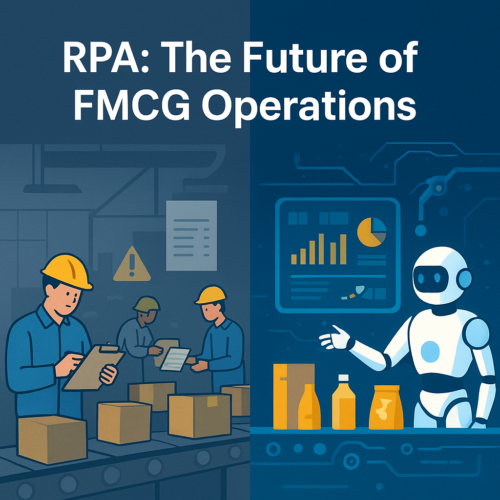RPA in FMCG: Automating Manual Work to Boost Efficiency in 2025
Introduction: Automation Is Reshaping the FMCG Industry
Fast-Moving Consumer Goods (FMCG) companies face continuous pressure to operate with speed, precision, and cost-efficiency. With high transaction volumes, complex supply chains, and growing customer demands, manual processes are proving to be a bottleneck.
Enter Robotic Process Automation (RPA) — a transformative technology that is streamlining operations, reducing manual workload, and enabling faster decision-making across FMCG enterprises. As we move further into 2025, RPA is not just a trend but a strategic investment.
What Is RPA and Why Does It Matter for FMCG?
Robotic Process Automation (RPA) involves the use of software bots to perform structured, repetitive tasks by mimicking human interactions with digital systems. These bots can be programmed to execute a wide range of operations, from data entry to report generation, across ERP, CRM, and other business platforms.
For FMCG companies, RPA is especially valuable due to the scale and frequency of tasks that require consistency, accuracy, and speed.
Top Use Cases of RPA in FMCG Companies
1. Automated Order Processing
RPA bots streamline order collection, validation, and processing by integrating with multiple order sources — eCommerce platforms, emails, distributor systems — and feeding accurate data into the ERP.
2. Inventory and Stock Management
Bots track real-time stock levels, automate replenishment alerts, and update warehouse records. This minimizes manual intervention and prevents overstocking or stockouts.
3. Invoice and Payment Automation
RPA extracts data from invoices, matches it with purchase orders, and initiates approval workflows, reducing processing time and ensuring compliance with payment terms.
4. Sales and Distribution Analytics
Bots can gather sales data from multiple systems, compile reports, and visualize trends through BI tools. This supports real-time decision-making and improves sales forecasting.
5. Customer and Vendor Onboarding
By automating document collection, verification, and database updates, RPA shortens the onboarding cycle and ensures accuracy in customer and supplier records.
6. Marketing Performance Monitoring
RPA bots can consolidate campaign data across platforms, generate KPIs, and deliver performance dashboards without manual effort.
7. Returns and Refunds Processing
Automating the returns process, from customer request verification to logistics coordination and financial adjustments, improves customer satisfaction and reduces turnaround time.
Benefits of RPA for FMCG Companies
Increased Efficiency: Processes that take hours manually can be completed in minutes with bots.
Enhanced Accuracy: Eliminates human error in data handling and reporting.
Cost Optimization: Reduces the need for extensive back-office labor.
Faster Time-to-Market: Enables quicker response to market changes and customer needs.
Scalability: Easily handle peak season workloads without adding headcount.
Improved Compliance: Ensures consistent application of business rules and regulatory standards.
Real-World Adoption: RPA Success in FMCG
Leading FMCG brands are already harnessing RPA to gain competitive advantage:
- Unilever implemented RPA across finance operations, reducing manual efforts by over 60%.
- Nestlé automated invoice processing, improving payment cycle efficiency.
- Procter & Gamble utilizes RPA in HR and logistics functions, enhancing operational visibility.
These examples highlight how automation is becoming central to FMCG digital transformation strategies.
How to Start RPA Implementation in Your FMCG Business
To leverage the benefits of RPA, FMCG companies should follow a structured approach:
- Identify Repetitive, Rule-Based Tasks
- Assess Integration Feasibility with ERP/CRM Systems
- Choose the Right RPA Platform (UiPath, Automation Anywhere, etc.)
- Pilot High-Impact Processes (Finance, Inventory, Sales)
- Scale Automation Across Departments
- Monitor Bot Performance and Continuously Optimize
Working with an experienced RPA consulting partner can ensure a smooth and scalable implementation tailored to your industry needs.
Why RPA Is Essential for FMCG Digital Transformation
In a market driven by volume, speed, and precision, RPA helps FMCG companies:
- Reduce operational costs
- Improve customer service
- Maintain real-time inventory and supply chain visibility
- Enable faster, data-driven decision-making
As automation continues to evolve, companies that invest early in RPA will be better positioned to scale, innovate, and lead.
Final Thoughts
Robotic Process Automation is no longer a futuristic concept — it’s a present-day imperative for FMCG companies aiming to stay competitive. By automating manual processes, brands can unlock greater productivity, accuracy, and agility across their value chain.
Whether you’re managing supply chains, processing invoices, or analyzing sales data, RPA can transform the way your FMCG business operates in 2025 and beyond.
Looking for RPA implementation for FMCG companies in Ahmedabad, India or Sydney, Australia Our team delivers tailored automation solutions to help reduce manual effort, optimize workflows, and accelerate growth.
Contact us today to schedule your free consultation.


